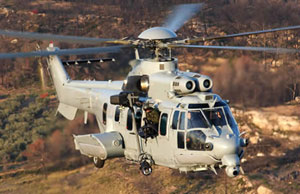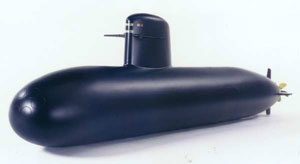Brazil, France sign $12-billion deal for submarines, helicopters
08 Jan 2009
France and Brazil have finalised a two-part defence agreement worth a cumulative €8.8 billion ($11.9 billion). While one part of the agreement covers the purchase and manufacture of 50 military transport helicopters the second part involves the manufacture of four conventional diesel-electric submarines, as well as a nuclear-powered submarine.
 The contract for helicopters involves the formation of a consortium of Eurocopter and Brazilian firm Helibras, which will locally produce 50 EC-725 military transport helicopters. The second portion of the defence agreement, involving leading French shipbuilder DCNS and Brazilian engineering and construction giant Odebrecht concerns the construction of four conventional diesel-electric and a nuclear-powered submarine. These subs will be built at a new yard to be created at Rio.
The contract for helicopters involves the formation of a consortium of Eurocopter and Brazilian firm Helibras, which will locally produce 50 EC-725 military transport helicopters. The second portion of the defence agreement, involving leading French shipbuilder DCNS and Brazilian engineering and construction giant Odebrecht concerns the construction of four conventional diesel-electric and a nuclear-powered submarine. These subs will be built at a new yard to be created at Rio.
Both contracts involve significant transfers of technology.
The 50 EC-725 helicopters will be built various versions for Army Aviation (16), Naval Aviation (16) and the Air Force (18). Deliveries are expected to commence in 2010. Once the orders are completed Brazil will become the largest operator of the EC-725 model.
Helibras, 45% owned by Eurocopter, will carry out the assembly work at its Itajuba factory, in Minas Gerais state. The turboshafts will be manufactured at Turbomeca's facility in Rio de Janeiro.
The agreement also ensures that a substantial part of the avionics will also be built in Brazil.
Eurocopter announced that, at $2.6 billion, this is the biggest helicopter contract ever signed in South America.
''This is an important achievement for Eurocopter, Helibras and the Brazilian government,'' announced Eurocopter president Lutz Bertling. ''This contract is the result of the close industrial partnership and the long-standing relationship that we have with Brazil, and we are particularly proud that the EC725s will be produced in this country. This contract heralds a new era for Helibras, which will become an outstanding centre of aeronautical excellence in South America.''
Louis Gallois, CEO of EADS, Eurocopter's parent company, added: ''EADS considers Brazil as a priority country in its long term partnership strategy. Our group has been developing its different activities there for many years: Airbus, ATR, military transport aircraft, space and security equipments. This major contract is fully in line with our strategy''.
 The EC725, the latest addition to the Cougar family, is a twin-engine helicopter with a five-bladed main rotor in the medium-lift category (11 metric tons). It has an exceptional fuel capacity and boasts a flight endurance of five-and-a-half hours. It has been designed to perform various missions, including combat search and rescue, long distance tactical transport, emergency medical services, logistics support, and naval assignments.
The EC725, the latest addition to the Cougar family, is a twin-engine helicopter with a five-bladed main rotor in the medium-lift category (11 metric tons). It has an exceptional fuel capacity and boasts a flight endurance of five-and-a-half hours. It has been designed to perform various missions, including combat search and rescue, long distance tactical transport, emergency medical services, logistics support, and naval assignments.
Prior to the signing of this contract, 96 EC725 and EC225 helicopters (civil version) had been ordered by 17 different countries.
The $9.3 billion naval contract, along with submarines, also covers the establishment of a new shipyard in Rio. DCNS will manage the yard until completion of the programme, after which control will revert to the Brazilian authorities.
The yard will be entrusted with two distinct programmes:
- Four diesel-electric submarines, to be designed by DCNS based on the Scorpene type and incorporating the specific requirements of the Brazilian Navy. The first submarine in the series will enter active service in 2015;
- DCNS will act as prime contractor for the four conventional-propulsion Scorpene type submarines to be built by the Joint Venture to be set up by DCNS and Brazilian partner Odebrecht. The submarines will be designed in cooperation with Brazilian teams under DCNS design authority to meet the Brazilian Navy's specific needs. DCNS will produce key advanced-technology equipment in its own plants.
As for the nuclear-powered attack submarine, DCNS will provide design assistance to the Brazilian Navy's design agency for all non-nuclear elements of the Navy's first nuclear submarine. Also, the entire nuclear power plant will be designed and built in Brazil.
DCNS will also be the prime contractor for the construction of the naval shipyard that will build these five submarines and also serve as a naval base for the Brazilian Navy.
It is also being speculated that the massive dual contract for helicopters and submarines may also influence the outcome of the ongoing FX-2 competition for the procurement of 36 new-generation multi-role fighters. This order is likely to include options for another 40. The Dassault Rafale fighter was shortlisted in October 2008 along with the Boeing F-18 E/F Super Hornet and the Saab Gripen NG, and a decision is expected later this year.
It would appear that with this strategic contract for helos, subs and a shipyard already in the bag, the Rafale may be the most likely choice for the FX-2 contract, though defence minister Nelson Jobim has emphasised that the choice will be impartial.



















